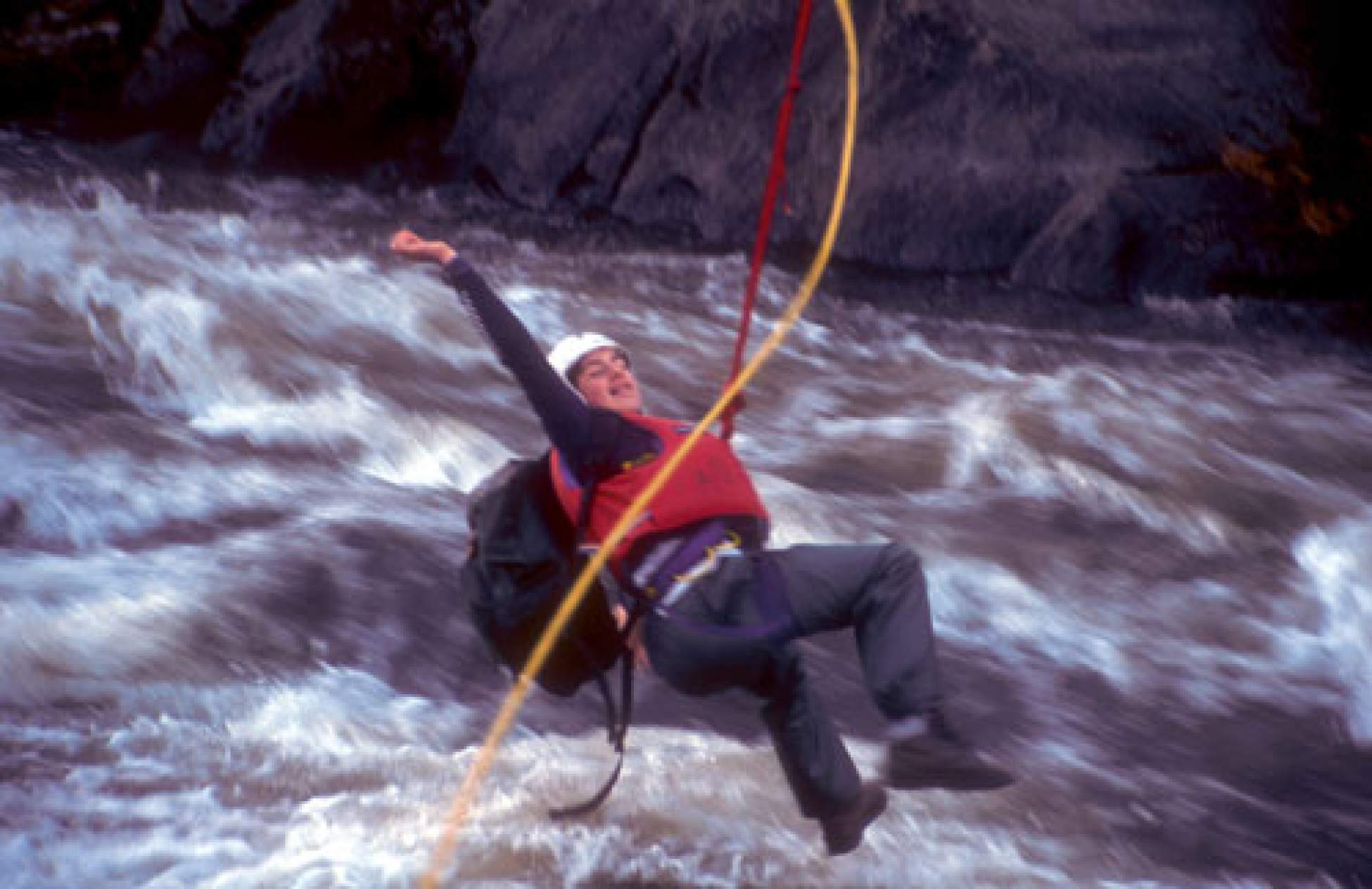It's 7:00 a.m. and Rachel Jamieson is getting ready for another tough day at the office. She pulls on her usual office attire, T-shirt, fleece sweater, quick-dry shorts, then crawls out of her tent and begins packing her gear into a waterproof canoe pack.
Rachel works as an instructor at Boundless Adventures and her office is 10 kilometres of pristine river in the Madawaska Valley, near Ottawa, Ontario. She'll be spending the next five days on trip, teaching people the ins and outs of white water canoeing, rock climbing and camping.
Brutal summer job, right? Well, sometimes it is, but most of the time there's no other place Rachel would rather be.
Working in the outdoor industry is, in many ways, one of the most rewarding jobs you could find. You get to meet a lot of amazing people, travel to some incredible places and get paid to play.
For Rachel, the constant challenge is the most rewarding part of the job. "There is no ceiling you can hit because there's always a new move or a new method required for improvement and success. When I'm at work I'm always pushing myself to try new things and improve on learned skills. I love tackling the personal goals".
It takes a bit more than hitting a couple of outdoor stores and buying a bunch of gear. It takes a lot of training, the drive to gain experience and, most importantly, an ability to work with people.
So, how does one snag a job like this? Well, it takes a bit more than hitting a couple of outdoor stores and buying a bunch of gear. It takes a lot of training, the drive to gain experience and most importantly, an ability to work with people.
Prior to being hired as an instructor, Rachel spent three intense months learning the ropes in a guide training program run by the School of Wilderness Arts and Technology. While on course, she ate, breathed and slept outdoor skills training.
"We teach skills that range from white water canoeing and kayaking, to rock climbing and wilderness first-aid" says Mike Desrochers, the program's director. "But the most important thing that we try to instil in our students is that no matter how good your hard skills are, it's your leadership and people skills that are going to carry the day."
"Though hard skills are the solid base of the job," says Rachel, "people skills are a huge part of working in the outdoor industry. People need to trust you in order to challenge themselves. The personal connections really make a trip."
This morning, Rachel and her co-instructors are preparing their clients for their first taste of white water canoeing. Lots of excitement, but some people are clearly nervous. To these new paddlers, the foaming water looks huge. Some are convinced that the nearest they want to come to the rapids is at the far end of their TV remote control.
This is the tough part—convincing people to move outside of their comfort zone. Many of these people are really afraid of the water. As a guide, you need to have the hard skills necessary to show clients that they are in good hands, and the people skills necessary to gain their trust.
"People skills are a huge part of working in the outdoor industry. People need to trust you in order to challenge themselves. The personal connections really make a trip."
Of course, like any job, you can't blow sunshine you-know-where forever. There are downsides. For Rachel, it's the long hours. "While on trip it's easy to forget about personal needs like sleep, rest and space. Downtime can become a precious commodity. On one of my toughest days, I woke up exhausted and paddled twenty kilometres with a paddling partner who chose not to paddle."
Mike Desrochers offers these observations about his chosen career: "Working in the outdoors, doing the things that you love to do and being paid for it, is extremely satisfying. However, if you're looking for a cushy, high-paying job, it may not be for you. Despite the increasing interest in adventure travel and ecotourism, the skills that most guides possess are generally undervalued." Put it this way. You won't get rich as a guide.
There are a lot of different ways to go about gaining the skills required to work as a guide. With the growing interest in adventure tourism, outdoor education programs have been springing up like mushrooms. A number of colleges and universities offer programs that vary in length from one-year diploma programs to four-year university degrees. There are also a number of private companies offering shorter intensive courses that focus more specifically on skills training (white water paddling, climbing, mountaineering).
The college and university courses tend to paint outdoor education with a very broad brush. A skills component is always included as part of the curriculum, but there is also a hefty bit of theory. For example, students in Algonquin College's Outdoor Adventure Program will find themselves hopping from kayaking and rock climbing, to accounting and marketing.
Private schools tend to run programs that focus more on skills training and gaining the certifications that are required to instruct others. Programs generally vary in length from one to three months and provide a fast-track into the industry. There is typically less emphasis on the business side of the outdoor industry, but they definitely give students a solid skills base (and depending on the program, a fat resume).
"I love the looks on clients' faces when they blast through a set of rapids they thought was impossible."
Rachel offers this advice for anyone interested in pursuing a career in the outdoors: "Many programs exist that offer various qualifications and soft skill training. Be sure to apply to a program or job that suits your needs and propels you to achieve your goals."
So, how do you get your foot in the door? How do you know (before you drop a chunk of time and cash) if this is for you? Try taking a course, paddling, climbing—whatever. Spend some time talking with the instructor and get their take on the industry. Chances are that they'll give you a pretty candid view of the good the bad and the ugly.
It is possible to do some exploring by taking courses and earning high school credits at the same time. Outward Bound Canada offers several outdoor programs that can be counted as credits toward a high school diploma.
Another way to get some information is to drop by a store that sells quality outdoor gear. Quite often people working in these places also do some guiding or instructing and are usually more than happy to answer questions and share some war stories.
Seven sets of rapids later, Rachel's group is stoked. The clients who were so nervous at the beginning of the day are clearly elated. "I love the looks on clients' faces when they blast through a set of rapids they thought was impossible. A memory that will last in my mind for a long time—eleven boats stopping mid-stroke to watch an eagle soar."
For instructors and guides, days are long and sometimes gruelling. But at the end of the day seeing the sense of accomplishment of the faces of your clients—that's payback.
Add this article to your reading list




